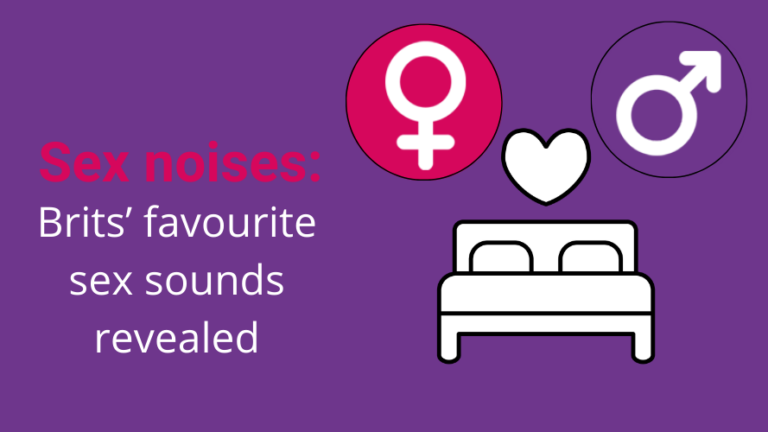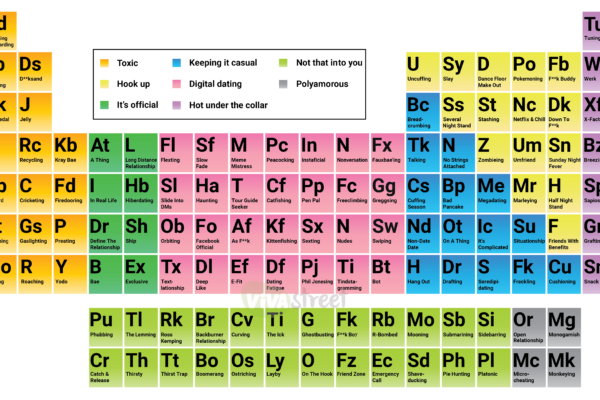- Moaning is the sexiest noise for 33% of men and 34% of women
- Silence in the bedroom is the top sex sound turn-off for 28% of men and 20% of women
- “Are you done?” Is the biggest turn-off for 24% of men
Are you a moaner or a screamer? Do you enjoy dirty talk, or are you a silent lover?
The sex noises and sounds people make while experiencing sexual pleasure vary and can reveal a lot about a person.
To get a better understanding of sex noises, Vivastreet surveyed nearly 2,000 Brits to discover which sounds and words people like and don’t like to hear during sex.
Here’s what the data revealed about our sex sound turn-ons and turn-offs.
The sex noises Brits like to hear in bed
According to the results, we Brits are a bunch of moaners, with survey findings revealing 34% of women, and 33% of men like to hear moaning sounds during intimacy.

Although moaning during sex could be seen as a device to amp up the bedroom and reassure your partner they are satisfying you sexually, according to sex experts, there’s more to this than meets the eye.
Certified Somatic Sex Educator Becky Price believes that moaning is the nation’s top sex noise for its deep sound.
She says that “deeper sounds vibrate lower in the body (both for the person making the sound and for the person hearing it) and thus can connect with and enhance our physical arousal.”
Perhaps that would explain why only 13% of women and 10% of men enjoyed the sounds of screaming, and even fewer like to hear squeaking during sex.
Dirty talk and heavy breathing
The findings also revealed the love for a particular sexual fetish amongst Brits, with talking dirty being the second favourite sex noise to tickle peoples’ pickle. Around 22% of women, and 23% of men admitted to enjoying dirty talk and erotic conversations during sex.
Becky believes that those who love dishing a kink like dirty talk need or want to feel a mental connection with their partner. “The more connected you feel during sex, the more loved, comfortable and safe you feel with your partner, which can lead to a greater bond.”
Sex and Relationship Coach Alison Pilling points out that: “Talking dirty is a way of expressing our desires, sharing who we are, and getting to know each other. When we hear words like ‘May I nibble your ear?’, or requests like ‘Would you slowly stroke the inside of my thighs’ or ‘Mmm that feels nice but slow down a bit’, we’re getting feedback and consent, offering us guidance, reassurance and clarity.”

Certified Sexological Bodyworker and Relationship Coach, Sue Sutherland, supports this theory of the link between sex, communication and connection, stressing that not only can this type of communication during sex be “intimate and hot, it’s also a way to stay connected.”
In third place, the survey revealed that 19% of women and 16% of men get turned on by hearing the breath of their partner. Heavy breathers during sex are “connected to their body and able to use their breathing to enhance or stimulate their pleasure,“ says Becky.
What Brits DON’T like to hear in bed
Have you ever heard of the phrase ‘awkward silence’? Yes, it seems that this is one of the top sex fears for Brits, with 20% of women and 28% of men admitting to not liking the sound, or more importantly the lack of, during sexual intercourse.

But why? According to Becky, “so much of human communication is verbal we can feel very disconcerted when the person we are with is silent. If they speak or make sounds, we know they are present with us, not drifting off, thinking about what to cook for dinner, work or the email they haven’t sent yet, etc.”
She continues to say that, “making noise or speaking, it’s part connecting and being in the experience together.”
It’s important to know that silence during sex doesn’t necessarily mean that you’re not enjoying the experience.
Becky says, “If you think about it, most of us first learn about arousal and orgasm through masturbation when we are living at home. Many men and women, therefore learn to be quick and quiet. These habits get set, and it can be difficult to change. Both men and women can have problems making noise when they are having difficulty feeling aroused and/or coming to orgasm. They can become so focused on ’trying’ to get their body to act in the right way, that all their attention is on their genitals. Making noise can feel like a big distraction for them.”

On the other hand, making noises or not during sex can be linked to personality traits. According to Clinical Sexologist Dr Claudia Six, “quiet people generally are quieter about their orgasms, just like people who are loud in life are loud in bed.” Also, silence during sex isn’t uncommon for those that are sexually repressed: “they will hold their breath and thus their vocalisations when climaxing.”
Faking pleasure
But hearing sounds during sex doesn’t always mean that your partner is enjoying the experience. Research has shown that many women, in particular, exaggerate noises to fake orgasms. Becky warns that “making noise can be a way of pretending either to yourself and/or your partner that you are having a good time. This is probably more the case for women, and particularly when they are faking an orgasm.”

However, “there are also times when the freedom to be silent can be beautiful. I think this is particularly when people are practising a more relaxed and lengthy approach to sex, there are times when you can just be in wonder at the beautiful feelings and no words or noises are necessary.”
Supporting the fact that no verbal sound is needed during sex, Dr Claudia says that the sounds of the act of sex itself or the “slapping’ sound of impact as it does so, are not to be overlooked as powerful sexual sounds.”
The great gender divide
Interestingly, when comparing the responses to sex noises more closely between men and women, there were some noticeable similarities. For instance, moaning, talking dirty, and heavy breathing ranked first, second and third for both sexes.
Looking into their sex fears there were some differences.
Top sex sound fears
Taking a further look into the sounds men and women hate to hear, the results were interesting for each gender.

Saying the wrong name was the worst thing for women to hear during sex. In heterosexual relationships, women are the ones being penetrated, and this is an emotionally big deal for most women. “Allowing someone into your core matters to most, and having someone else’s name uttered is usually incredibly disrespectful and hurtful,” says Sue.
Sex, Pleasure & Intimacy Coach Sarah Rose Bright agrees: “When you are intimate with someone you are at your most vulnerable and hearing your partner call somebody else’s name, especially an ex can feel like an insult or it can seem that your partner’s attention is elsewhere.”

However, although it may be hard to accept for many, this may not always be the case. While many might suspect that their partner has feelings or is fantasising about someone else, Sarah believes that “when you are in a heightened state of arousal, it is natural that memories can arise spontaneously.”
Great expectations
In stark contrast, the number one worst thing men could hear during sex was ‘Are you done?’ with 24% admitting that to be their top sex noise turn off between the sheets. ‘Is that it?’ came in second for men. Are these expressions linked to performance anxiety? “Of course they are,” says Becky.
It’s not surprising why these expressions are the worst to hear for men, as Becky believes that they are both very dismissive phrases that suggest that their partner is not connected to them. “‘Are you done yet?’ indicates that your partner is bored and just wants you to hurry up, placing pressure on you to have an ejaculatory orgasm as soon as possible” whereas “‘is that it?’ indicates disappointment that what you did wasn’t good enough or for long enough.”

She adds that both the phrases indicate “there is a focus on achieving ‘good enough’ sex, rather than having a loving intimate and fun time together.”
Alison further reinforces the link between mens’ preferred sex sounds and performance anxiety, stating that “There can be a lot of performance anxiety during sex, men worrying about maintaining their erection or arousal, thinking about whether they’re ‘doing it right’ or techniques. Much of this confusion about intimacy and sex can be minimised by wonderful communication throughout the time, rather than just in the last few seconds.”
The pressures of men to perform in the bedroom is something Somatic Sex Coach Elaine Young says is linked to society, where men are “often told by society and pornography they have to be the one ‘doing’, that they should be able to sustain an erection always or able to make love for a certain amount of time.”
It seems that for both men and women, a toilet break is enough to kill the moment. Around 15% of men and 16% of women revealed that hearing ‘I need to go to the toilet’ was the third-worst thing to hear during sex. But according to Alison, it should be seen “as simply a pause in pleasure – a time to breathe, relax and regroup.” Most importantly, “the more we can do to feel safe and relaxed in intimacy, even if it means a loo break, the greater our experience can be. Pauses help to move us to break the idea that sex is a conveyor belt with a fixed starting and endpoint. Moving away from a focus of orgasm to a focus of connection allows more variety and fun, creating a sense of togetherness rather than performance.”
Brits go-to orgasm word
The top words climaxed to saw slight differences between men and women. For women, ‘Ohhhhhhhhhhh’ proved to be the number one go-to orgasm word for 21% of respondents. This was followed by ‘Don’t stop!’, with 19% eager to reach orgasm. When it comes to expressing our favourite orgasm words, it appears that we may have outside influences. According to Sarah, “How we do sex can result from habits that we pick up along the way, whether from watching the movies or porn or with partners.”

Men’s go-to orgasm word on the other hand was ‘I’m coming’ (32%). “I think some men say that ‘I’m coming’ as an announcement as it may have an impact on their partner in how they want to receive the ejaculation, i.e, they may or may not want it inside them,” Sarah continues.
However, Alison explains that “hearing these precious words can offer reassurance and relaxation, a feeling of satisfaction and connection.”
For Sue, it’s more “about what the goal of sex is.” She argues that “most people will say when the man comes, penetrative sex is over. For many, it is the most pressurised and performative aspect of sex. Don’t come too quickly, don’t take too long, don’t lose your erection. So ‘I’m coming’ can be a signpost, a warning and an achievement all in one!”
Interestingly ‘I love you‘ was the least likely go-to orgasm word for men, with just 3% saying it was their orgasm word of choice. If sex is associated with love, connection ….how can that be? According to Becky, this is not a surprise. She goes on to say that “for most men, if they want to have an ejaculatory orgasm they focus on bringing all the energy into their genitals, thoughts of the heart would be a distraction.”
Finding your authentic sex sound
Whichever sex noise you use during sexual intercourse, it’s important to know that all sex sounds are normal. For Sue, “often people use noises as a way to signal they are having a good time, to encourage their partner to climax, because they think they should or should not.”
People enjoy hearing levels of sound from their partner because it’s arousing “and at the very least, one likes to know what one is doing to one’s lover is effective and producing the desired results,” adds Dr Claudia.
But for Sarah, “there is no such thing as normal when it comes to human sexuality! We like to think there is a ’normal’ that we fit into, but we are all so unique.”
But not everybody feels comfortable to express themselves during sex. When with your partner, Sue advises that couples should openly ask each other whether making noises is something they enjoy. “You can make it a game. Remembering to have fun, and adding some animal noises or funny phrases can be brilliant.”

How to find your sex sound
If you’re looking to find your authentic sound in the bedroom, the key thing is to “communicate”, says Sue, while Alison believes it’s about being “authentic in life, feeling relaxed within whomever you go to bed with, feeling brave to be open and vulnerable with your partner.”
Understanding each other sexually is always better than faking pleasure, as this can be quite disheartening, and it may be more noticeable than you think. “We can all tell fake or porn-y noises from the real thing, no one feels good about that,” she continues.
So, even though sex noises are arousing, never feel pressured to make them if it’s not genuine. Overall, “being truthful and brave adds to the magic of authentic sounds.” However, if you’re a silent lover, exploring sex noises can really change the pleasure you experience.
If you are the one to make sex noises during intimacy, “making sound is a really important part of pleasure and stopping noise prevents pleasure from fully moving through the body,“ says Sarah.
But those that express themselves verbally during sex might be having a better experience in the bedroom than those who do not. Alison believes that “using your voice to ask for sensual, nurturing touch all over your body (not just in the T-Zones) will send you into a real rapture.”
It seems as though no matter the sex sound, it’s communication that makes us feel connected to those we are intimately engaging with.





